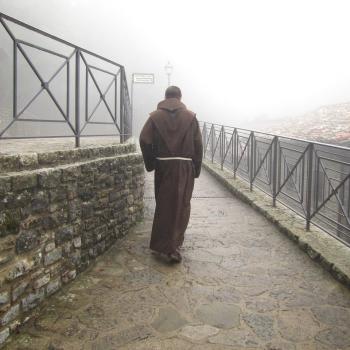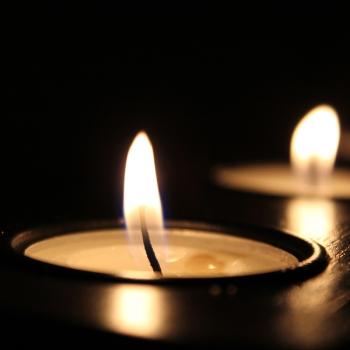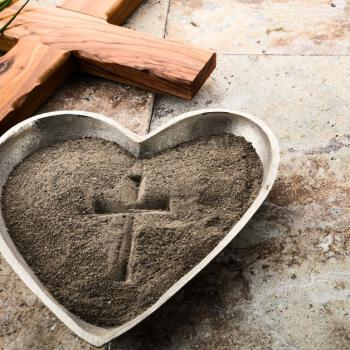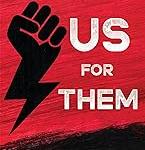Who Will Roll Away the Stone?
When the sabbath was over, Mary Magdalene, and Mary the mother of James, and Salome bought spices, so that they might go and anoint him. And very early on the first day of the week, when the sun had risen, they went to the tomb. They had been saying to one another, ‘Who will roll away the stone for us from the entrance to the tomb?’ When they looked up, they saw that the stone, which was very large, had already been rolled back. Mark 16:1-4
Three women who loved Jesus came to be near him, even though they believed him to be dead. They came not knowing how they would get there. They came asking, “Who will roll away the stone?”
And all of us have felt the weight of that stone. We have all spent days, weeks, or even a lifetime in casual conversations, saying, “I’m fine, how are you?”
Meanwhile, a weight that nobody can see is crushing the life out of us.
We’ve been taught to carry things alone, to pull our own weight and prove our own value. In this system of pulling, proving, and justifying, we’ve been convinced that freedom means being in control of our own life. And we’ve been convinced that true power means having control over others.
When we’re bombarded with hardship and suffering beyond our control (in our household, our nation, and our world), it can leave us feeling powerless and defeated.
Who will roll away the stone?
Women Bore the Weight
This is how the women at the tomb are witnesses for us today, and for all time. Their teacher, messiah, and friend was killed in front of them and they had no control to stop that event. A violent system, with soldiers and armies at its disposal, took the life of their Lord and they had no control to stop that system.
They were up against a lot, bearing the weight of the event and the weight of the system. They bore the weight of their own shock and grief. Who will roll away the stone?
But this weight did not stop them from coming to Jesus, and the weight did not stop Jesus from rising from the grave.
Because while we were yet sinners, powerless and choking under that weight, Jesus took upon himself our sin and suffering. On the third day, as the dust lay in the darkness of the tomb, his chest began to rise as the free air of God’s grace filled our lungs, and the lungs of our ancestors, and the lungs of our grandchildren, as Jesus began to roll away every stone.
I Know What It’s Like
I know what it’s like when our fears and wounds grow so heavy that our heart feels like a dead weight within us. Who will roll away that stone?
I know what it’s like to feel saddened and angry at the hatred, arguments, and division in our nation. It’s a growing obstacle that we cannot ignore. Who will roll away that stone?
I know what it’s like to feel shattered by the footage of war, bombs, starvation, and violence in our world. It seems so far away that we can feel powerless to help. Who will roll away that stone?
Jesus Christ who lives and breathes, who heals and restores, has already begun to roll away every stone. Bring to him the weight of your fears, and the weight of your wounds. Lay at his feet your hardened heart. He can transform it, welling it up into a spring of eternal life.
Jesus Christ who walks beside you, who transforms communities, has already begun to roll away every stone. Bring to him your arguments, and your accusations against your neighbor. He can transform them and grant us reconciliation.
Jesus Christ, the King of Heaven who will draw all nations to himself under the banner of love, has already begun to roll away every stone. Bring to him your cries for justice, your anger at violent systems, and your compassion for those who suffer. Those desires are reflections of his heart for the poor, the prisoners, and the oppressed.
Bring your insurmountable stone to Jesus.
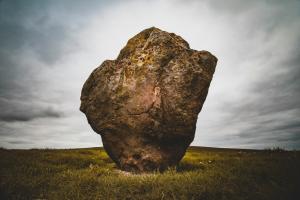
Risen to Real Life
He has risen to breathe new life into all creation, and to breathe new hope into our real lives.
When those women saw that the stone had been rolled away, they were still processing their real grief, and they were still under the real Roman occupation.
Real life didn’t disappear, but those things were no longer obstacles in the same way they had been before.
The followers of Jesus were set free from a different kind of weight, and they were liberated to embody faith, hope, and love. They were set free to bring good news to the poor, to the prisoners, and to the oppressed because a weight had been lifted.
They no longer sought to be in control; they sought to be transformed.
No longer seeking power through controlling others or controlling the ever-changing obstacles of life, they grounded themselves in a higher power, an inner authority than no one could take away. When Christ died and rose again, he raised our souls to Heaven, but he also raised our citizenship above that of this world. He raised our lives above our circumstances, above our suffering and mistakes, above the reality of our obstacles. He invites us into new life now, not later in Heaven, but now. New life in his Kingdom under the banner of love.
He has already begun to roll away every stone. And every time we seek healing, every time we seek reconciliation and cry out for justice, every time we love as he loved us, we are being led by him, and taught by him, and raised up to new life by him to embody his Kingdom.
Every day this world tries to bring us down by tempting and entangling us with the weight of power, privilege, and control. Jesus reminds us that love empties itself. Love rises again. Love breathes new life into this world.
If you seek freedom from the weight of that stone, bring it to Jesus. Even if it seems impossible to move.
Three women who loved Jesus came to be near him, even though they believed him to be dead. They came not knowing how they would get there. They came asking, “Who will roll away the stone?”.
But every stone had begun to roll, because Jesus Christ has risen today.
To read more posts, visit my column here. Check out my writing in “Soul Food: Nourishing Essays on Contemplative Living and Leadership”, or listen to me read a portion of my writing for the podcast Read, Pray, Write.





